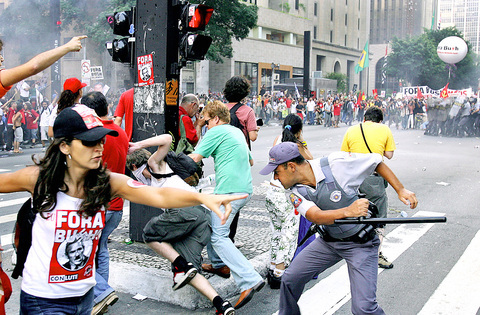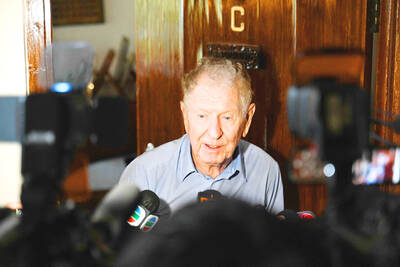The beginning of US President George W. Bush's five-nation Latin American tour sparked protests across the region on Thursday, with thousands of demonstrators and police clashing in Brazil and students in Colombia lobbing explosives at authorities.
More than 6,000 students, environmentalists and left-leaning Brazilians held a largely peaceful march through the heart of Sao Paulo before police fired tear gas at protesters and beat them with batons. Hundreds fled and ducked into businesses to avoid the chaos, some of them bloodied.
Authorities did not say how many people had been injured, but Brazilian media said at least 18 people were hurt and news photographs showed injured people being carried away.

PHOTO: AFP
Protesters said scuffles broke out when radical demonstrators provoked officers and threw rocks and sticks at them -- but said police overreacted. A police officer who declined to give his name in keeping with department policy confirmed that extremists appeared to cause the confrontations.
After the clash, the protest continued peacefully but with far fewer people. The marchers waved communist flags and railed against Bush, the war in Iraq and the ethanol proposal. Almost all had departed by sundown, and the streets were calm several hours later when Bush arrived in Sao Paulo.
In the southern Brazilian city of Porto Alegre, more than 500 people yelled "Get Out, Imperialist!" as they marched to a Citigroup Inc. bank branch and burned an effigy of Bush. Protesters also targeted the US Consulate in Rio de Janeiro, splattering it with bright red paint meant to signify blood.
In Colombia, about 200 masked students at Bogota's National University clashed with 300 anti-riot police carrying shields and helmets. The students were spray-painting anti-US slogans on walls and shouting "Out, Bush!"
Police fired water cannons and tear gas, and the students hurled back rocks, fireworks, a few Molotov cocktails and dozens of "potato bombs" -- small explosives made of gunpowder wrapped in foil. There were no immediate reports of injuries or arrests.
The Colombian demonstrators called for the scuttling of a US-Colombia free trade agreement signed in November and currently stalled in US Congress, and accused Washington of meddling in the South American nation's internal affairs by sending some US$700 million a year in mostly military aid.
Colombia is beefing up security in the capital for Bush's visit tomorrow, the first by a sitting US president since Ronald Reagan in 1982. About 21,000 security agents will patrol the capital.
Meanwhile, Colombia's police chief said authorities have foiled leftist rebel plans for terrorist acts to disrupt Bush's visit, but offered no details.
Asked about the protests, White House spokesman Gordon Johndroe said Bush "enjoys traveling to thriving democracies where freedom of speech and expression are the law of the land. He has a positive agenda here that we believe the people of Brazil and the rest of the Americas will benefit from."
Some protesters in Brazil carried stalks of sugarcane -- which is used to make ethanol -- and a banner reading: "For every liter of ethanol produced, 4 liters of fresh water are consumed, monoculture is destroying the nation's greatest asset."
"Bush and the United States go to war to control oil reserves, and now Bush and his pals are trying to control the production of ethanol in Brazil. And that has to be stopped," said Suzanne Pereira dos Santos of Brazil's Landless Workers Movement.
Activists from the environmental group Greenpeace warned that increased ethanol production could lead to further clearing of the Amazon rain forest as well as cause social unrest, since most sugarcane-ethanol operations are run by wealthy families or corporations that reap most of the benefits while the poor are left to cut the cane with machetes.
In Mexico, which Bush is scheduled to visit on Tuesday, about two dozen demonstrators gathered in front of the US Embassy in the capital chanting slogans against the US project to construct border fences and Bush's visit.
also see story:
Bush's job approval rating creeps up in AP-Ipsos poll

US PUBLICATION: The results indicated a change in attitude after a 2023 survey showed 55 percent supported full-scale war to achieve unification, the report said More than half of Chinese were against the use of force to unify with Taiwan under any circumstances, a survey conducted by the Atlanta, Georgia-based Carter Center and Emory University found. The survey results, which were released on Wednesday in a report titled “Sovereignty, Security, & US-China Relations: Chinese Public Opinion,” showed that 55.1 percent of respondents agreed or somewhat agreed that “the Taiwan problem should not be resolved using force under any circumstances,” while 24.5 percent “strongly” or “somewhat” disagreed with the statement. The results indicated a change in attitude after a survey published in “Assessing Public Support for (Non)Peaceful Unification

The CIA has a message for Chinese government officials worried about their place in Chinese President Xi Jinping’s (習近平) government: Come work with us. The agency released two Mandarin-language videos on social media on Thursday inviting disgruntled officials to contact the CIA. The recruitment videos posted on YouTube and X racked up more than 5 million views combined in their first day. The outreach comes as CIA Director John Ratcliffe has vowed to boost the agency’s use of intelligence from human sources and its focus on China, which has recently targeted US officials with its own espionage operations. The videos are “aimed at

‘MISGUIDED EDICT’: Two US representatives warned that Somalia’s passport move could result in severe retaliatory consequences and urged it to reverse its decision Minister of Foreign Affairs Lin Chia-lung (林佳龍) has ordered that a special project be launched to counter China’s “legal warfare” distorting UN Resolution 2758, a foreign affairs official said yesterday. Somalia’s Civil Aviation Authority on Wednesday cited UN Resolution 2758 and Mogadishu’s compliance with the “one China” principle as it banned people from entering or transiting in the African nation using Taiwanese passports or other Taiwanese travel documents. The International Air Transport Association’s system shows that Taiwanese passport holders cannot enter Somalia or transit there. The Ministry of Foreign Affairs (MOFA) protested the move and warned Taiwanese against traveling to Somalia or Somaliland

Four former Hong Kong opposition lawmakers jailed in the territory’s largest national security case were released yesterday after more than four years in prison, the first among dozens convicted last year to regain their freedom. Former legislators Claudia Mo (毛孟靜), Jeremy Tam (譚文豪), Kwok Ka-ki (郭家麒) and Gary Fan (范國威) were part of a group of 47 public figures — including some of Hong Kong’s best-known democracy advocates — who were charged with subversion in 2021 for holding an informal primary election. The case fell under a National Security Law imposed on the territory by Beijng, and drew international condemnation and warnings